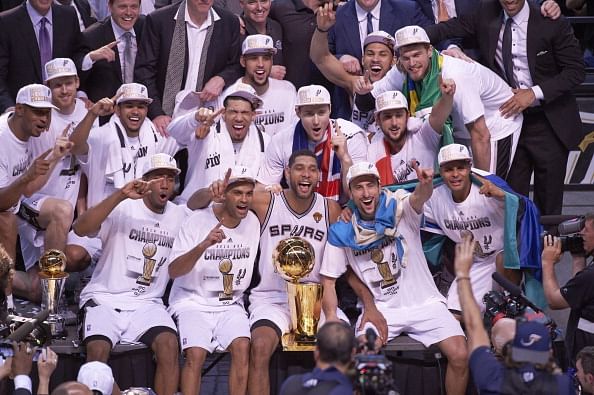
2014 NBA Finals: San Antonio Spurs complete their redemption
Just outside the visitors’ locker room in the AT&T Center in San Antonio, a group of men stood huddled, with their fists clenched and their arms raised. It resembled the manner in which sticks would be arranged for a bonfire. But this was a different fire, an innate fire to confront and stave off elimination, an intense desire to retain what had been theirs for two years running.
The cynosure of all eyes was their leader, the “King” trying to rally his troops for their fortress was under attack and their prized possession about to be looted.
“Follow my lead” he said. Follow his lead they did for the first 6 minutes 54 seconds of the game. They got off to a blistering 8-0 start and the lead ballooned to 22-6 with some beautiful ball movement and a couple of 3-pointers. Staples of Miami Heat basketball.
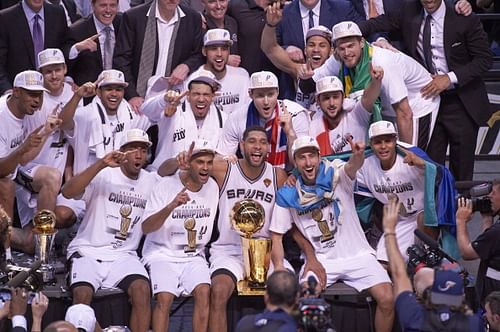
But the script which had meandered for a short duration soon returned to its course. The Spurs’ offense which had been sputtering until then kicked into full throttle and began to wrest control of the game from the road team.
In the early stages of the first quarter, Miami showed glimpses of why they were the defending champions. The offense wasn’t allowed to stagnate as the ball moved freely; a couple of dribble drives led to kick outs to the open man on the perimeter, who then did his share of the job by knocking down the three. On the defensive end, rotations were crisp and early ball pressure surprised the Spurs’ guards. Tony Parker ended the quarter with a torrid 0 from 4 from the field.
But thankfully for him, the Spurs possess several layers of depth in their roster and their multi-pronged offense soon began to lay siege on the Heat defense. Manu Ginobili kick-started the comeback with a three-point play followed by a three pointer. In the ensuing possession, noticing that Ginobili was on a roll and wanting to rid him of the ball, Ray Allen and Chris Andersen jumped out to trap Ginobili near the three-point line. But the trap lacked conviction and the wily veteran managed to find Leonard parked downtown and Leonard connected. The lead was slashed to seven and Erik Spoelstra was forced to call a timeout.
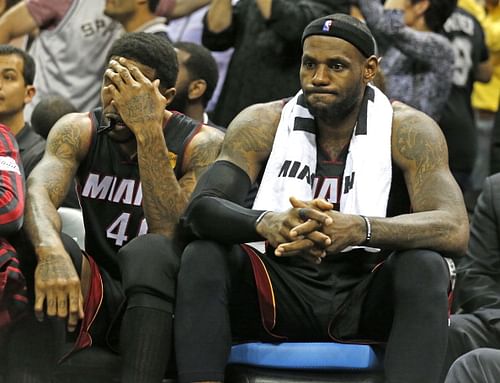
Conviction - A word that had eluded the Heat thus far in the Finals. The swagger that you would generally associate with the two-time defending champions was noticeably absent. Make no mistake - this was a team whose confidence bordered on cockiness ever since LeBron made “The Decision” to take his talents down to South Beach.
The Spurs had been aggrieved by the events that had transpired during the last 30 seconds of Game 6 in last year’s Finals. The memory was fresh. The scars of Game 6 hadn’t healed yet when the team reported for training camp after a painful off-season of introspection. The machinations had already begun early in the off-season as the upper echelons of the organisation had debated and concurred that the roster required a little pruning. Out went Gary Neal and DeJuan Blair to the Bucks and the Mavericks respectively. Reinforcements came in the form of Marco Belinelli and Jeff Ayres. The replacements were primarily direct, with subtle upsides to their game. Belinelli’s range was more consistent than Neal’s. And having played in Chicago under Tom Thibodeau, Belinelli was an upgrade on the defensive side of the floor in contrast to the shaky defense offered by Neal.
And so began the journey to redemption for the Spurs, the quest for a fifth title in the franchise’s history. On the first day of training camp, head coach Gregg Popovich showed a tape of the disastrous last 30 seconds on that fateful night of Game 6. The film would have made the players wince, but the message was loud and clear – “They have what should have been ours. It’s high time we get it back.” While the entire basketball world was in awe at Miami Heat’s plan to rest Dwyane Wade and his ailing knees, the Spurs, inconspicuous to the outside world, concocted a master plan of their own to ensure that their players would be fresh for a long postseason stint.
Manu Ginobili was prudently forbidden to participate in the FIBA World Cup qualifiers as his body had barely withstood the travails of a deep postseason run following a long NBA season. Tim Duncan had a minutes’ restriction imposed on him, with the ceiling at 30 per game. Consequently his production declined in the initial stages of the season and critics were quick to latch on, questioning whether he had enough miles in the tank to last the season. (This writer even had the audacity to place him on the list of veterans who had overstayed past their prime - https://www.sportskeeda.com/basketball/5-nba-veterans-who-should-hang-up-their-boots-at-the-end-of-the-season/)
As the season progressed, the Spurs began replicating the consistency that had come to typify them in the past decade and a half . This was punctuated by a 19-game win streak that came to an end at the hands of the Oklahoma City Thunder. When the curtains were drawn on the regular season, the Spurs finished with an impressive 62-20 record, sufficient to clinch the top seed and ensure home advantage throughout the Playoffs.
In the first round they faced 8th seed and perennial rivals, the Dallas Mavericks. The series was a hotly contested one as it extended to Game 7 in which the Spurs took care of business. Up next were the Trailblazers and they were dismissed with considerable ease as LaMarcus Aldridge and co. were no match for the efficiently balanced system of the Spurs. In the Conference Finals, the Spurs toyed with the Thunder before getting down to business and wrapping up the series in 6 games.
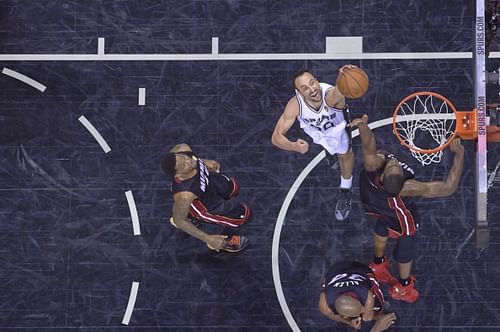
By now the Spurs were a well-oiled machine, playing some really beautiful basketball on the offensive end. It was a system, downright simple but extremely hard to defend. The ball had multiple touches until the perfectly weighted pass would find a teammate in the perfect position to score. The chemistry between the players seemed to cross the peripheral boundaries of the body and extend into the psyche. This was basketball divinity.
But up ahead were the Miami Heat, Eastern Conference champions for four straight years, bidding to become only the third franchise to ever accomplish winning three consecutive titles, a feat known as the “three-peat.” Game 1 was a pretty close affair until an AC failure at the AT&T Center rendered LeBron ineffective. The Spurs capitalized and comprehensively won the game. In the second game, with the air conditioning system fully functional, LeBron was back to his mercurial best and the Heat rode on his back en route to a 98-96 victory.
The next two games were scheduled to take place at the American Airlines Arena, bastion of the Heat, with not a single home loss to account for in the Playoffs. But they turned out to be disproportionately lopsided affairs as the Spurs ran roughshod over the non-existent Heat defense. Kawhi Leonard was the wrecker-in-chief as he not only scored effortlessly but also managed to make life worse for LeBron with his pesky, long arms.
The Heat did not know what had hit them. But the general consensus was that the effort was lacking, that the Spurs wanted the Larry O’Brien trophy more than they did. The concierge of the Big 3 had failed to reprise their roles of 2013. Mario Chalmers’ confidence had deserted him and the Heat were ergo deprived of the dribble penetration that had effectively disrupted the Spurs defense a year ago. Ray Allen was not his usual self and was guilty of over-dribbling on several occasions. Shane Battier, a key cog in the team last year with his timely 3’s and uncanny ability to draw charges, was certainly not his usual self.
But most importantly, the duo of Dwyane Wade and Chris Bosh who had hitherto proved a perfect foil to LeBron, inexplicably disappeared when the team needed them the most. Chris Bosh seemed bereft of the veiled aggression that personified him and Dwyane Wade looked woefully out of sorts when faced with a compact Spurs defense.
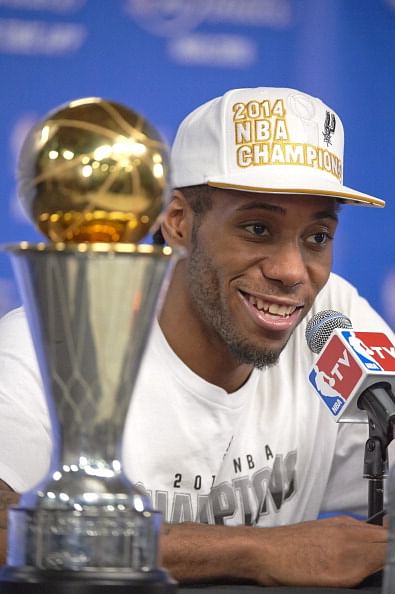
The Finals came to a premature end in Game 5 as a hot start by the Heat fizzled out to culminate in an emphatic win for the Spurs. It was a special night for Kawhi Leonard as he was named the Finals MVP, more special because the night coincided with Father’s Day and Leonard had lost his father when he was just 16.
As another NBA sojourn came to an end, the prospect of an uncertain offseason loomed large for the Big 3, with all three having early-termination options in their respective contracts.
For the Spurs though, redemption was finally complete.